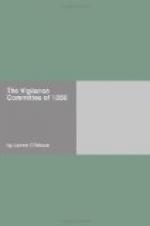advised the Colonel to see the woman himself.
Colonel Baker did go, Governor Foote accompanying
him. The Governor said he had never witnessed
such a manifestation of a woman’s power and
irresistible influence. Belle Cora was inspired
to the height of heroism, in her devotion to Cora,
her purpose to secure his acquittal and prevent his
sacrifice. She first appealed, implored, begged
Colonel Baker to stand by his engagement. He
making no response, and seeming not to yield, she commanded
that he must, that he should. She would double
his fee. She would have him appear as Cora’s
counsel, if he did no more than sit in Court with Cora
near him, and speak no word at all. But go in
Court and have it known that he was Cora’s counsel,
he must. She was inflexible in this. And
when the day of trial came Colonel Baker did appear,
together with General James A. McDougall, Colonel
James and Frank Tilford — as counsel for Charles
Cora, and it was on that trial that he made the most
eloquent and extraordinary argument and plea of his
life in a criminal case. It was not a packed
jury in Cora’s case. Care had been taken
to empanel only good, respectable citizens, some of
whom, a short time afterward, became members of the
Vigilance Committee, and in great or less degree participated
in the seizure of Cora from the county jail and in
his condemnation and execution. Three of the jury
were prominent Front street merchants. Notwithstanding
all the feeling against Cora, the popular unrelenting
prejudice, and the great preponderance of the foremost
legal minds of the San Francisco Bar, to his prosecution,
Alex. Campbell, General Williams and Colonel
Sam. Inge, U. S. District Attorney, to assist
the public prosecutor, the jury disagreed, and of
the jurors who held out against a verdict of guilty
of murder were three Front street merchants and others
of equal high standing in the community. Cora
was held for another trial, and it was while awaiting
this that he was seized by the Vigilance Committee,
taken to their rooms and hanged.
The excitement consequent upon the killing of Richardson did not culminate in the formation of a Vigilance Committee, similar to that of 1851, but it influenced the public mind in that direction. It was the piling of the combustibles which required only the next spark from the electric battery to fire the heap to consuming flames. There were still in the city a round number of the early Vigilance Committee which had ridden San Francisco of the “Sydney thieves;” some who had also, in 1849, suppressed the “Hounds;” and they were prepared again to meet violence and lawlessness with the stronger arm of organized force and the quick, sharp vengeance of the lex talionis.




